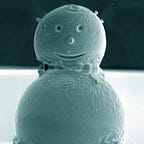Thoughts on David Deutsch’s constructor theory
Prompted by a discussion with Micah Redding and others in the Christian Transhumanist Association Fabebook group, I have been studying and thinking about David Deutsch’s constructor theory.
David Deutsch is a pioneer of quantum information theory, a supporter of Hugh Everett’s interpretation of quantum physics, and the author of the highly recommended books “The Fabric of Reality” and “The Beginning of Infinity.” When Deutsch speaks, we should listen carefully.
Micah Redding interviewed David Deutsch in Episode 35 of the Christian Transhumanist Podcast, worth carefully listening to.
Constructor Theory is defined as “a new approach to formulating fundamental laws in physics.”
“Instead of describing the world in terms of trajectories, initial conditions and dynamical laws, in constructor theory laws are about which physical transformations are possible and which are impossible, and why.”
Constructor theory “has a radically different mode of explanation, where the main objects are physical transformations, or tasks.”
“Its fundamental statements are about what tasks are possible, what are impossible, and why. This allows one to incorporate more of physical reality, including entities, such as information, that have inherently been regarded as approximate and derivative as a result of the traditional physics take on things.
A constructor is something that can operate a given physical transformation on some physical substrate, and stays the same after performing this task, so that it can perform the same task over and over again.
If a task is not forbidden by fundamental laws, then there must be a constructor for it. A universal constructor is a constructor able to perform all tasks.
Constructor theory is anticipated in “The Beginning of Infinity.” In the book, Deutsch defines a constructor as a device capable of causing other objects to undergo transformations without undergoing any net change itself, and a universal constructor as a constructor that can cause any raw materials to undergo any physically possible transformation, given the right information.
Eventually, Deutsch and his collaborators want to develop a full algebra of constructors, which would explain how constructors combine and operate together.
In Micah Redding’s words, Deutsch is trying to re-frame fundamental physics as a set of technologies.
The words inscribed on Karl Marx’s tomb immediately come to mind:
“The philosophers have only interpreted the world in various ways. The point however is to change it.”
We humans are universal constructors, “factories for transforming anything into anything that the laws of nature allow.” Therefore, according to Deutsch, our potential is unlimited.
What is fundamental?
There is no strong consensus, in science and philosophy, on what is really fundamental and what is less fundamental and should be derived from something more fundamental.
Thermodynamics is formulated in terms of concepts (like density, pressure, heat, temperature, and entropy) different from those used to study the dynamics of particles and fields. According to most experts, thermodynamics is less fundamental than the dynamics of particles and fields, from which thermodynamics can be derived with statistical methods.
But a full derivation is still elusive. Some experts are persuaded that thermodynamics is MORE fundamental, not less, and some kind of downward causation is at work (see Chapter 18 of my book). Downward (top-down) causation doesn’t overwrite bottom-up causation, but exploits gaps in the bottom-up physical laws: When bottom-up causation would leave an outcome under-determined (e.g. quantum collapse, strong chaos), top-down causation takes over.
I tend to take this point of view seriously, but I also think it is very far (too far fro practical purposes) from our intuition, which is built on everyday experience and pre-20th century physics. I must have an intuitive mental picture of how things work. Give me colliding billiard balls!
But constructor theory focuses on what constructors can do, without offering mental pictures of how they work. It is a very high level theory that doesn’t (even try to) propose intuitive visual pictures of how things happen.
However, I like the openness of constructor theory, which seems to leave room for downward causation. Things can happen in more than one way, and we’ll build constructors to make things happen in more and more useful ways, without limits.
[*] My book “Tales of the Turing Church: Hacking religion, enlightening science, awakening technology” is available for readers to buy on Amazon (Kindle | paperback).
Please buy my book, and/or donate to support other Turing Church projects.
Cover picture from Marco Verch/Flickr., picture from Nicki Lisa Cole.
